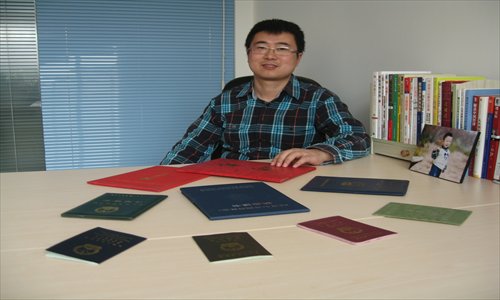Certified maniacs

Zhang Wen'ge is one of those people commonly known these days as "certificate maniacs."
Over the past few years, Zhang has passed several examinations and received 12 hard-earned certificates, which he divides into five categories - foreign languages, computer sciences, economics, law, and hobbies.
Zhang, 34, from Xicheng district, works as a chairperson's secretary and general manager's assistant at Shuoren Energy.
It all started when he was in college from 1998 to 2002. Zhang felt great pressure in getting a job, so he took lessons to get certificates on accounting, computer operation, English and Japanese.
Zhang was seen as special among his classmates back then, but now getting all kinds of certificates has become a wider trend for college students, especially for junior students, who face a hugely competitive job market.
Zhang left college years ago, but his quest for qualifications didn't stop there. Zhang is currently preparing for examinations to get the Certificate of Accounting Professional (CAP), and a certificate from the Association of Chartered Certified Accountants (ACCA).
He has to study late into the night for months to prepare, but Zhang takes pride in his achievements.
"All the efforts and investments made in education are worthwhile," Zhang said.
High expenses, high returns
Zhang's most recent certificate was a qualification to be a corporate legal counselor, as his company often does business with law firms. To do the job better, Zhang read legal textbooks on his own time, but later decided to go further and take lessons. "Having knowledge of the law makes it easier to communicate with lawyers," said Zhang.
When he heard he had earned the certificate, Zhang was ecstatic. "After all, it's totally different from my job duties and my educational background," said Zhang, noting that the qualification brought him one step closer to becoming an "inter-disciplinary talent".
"I want to improve and perfect myself through learning," said Zhang. "I hope I can go further, find more and experience more possibilities."
Zhang noted that his certificates have been very helpful in practical terms, especially when he was trying to enter the industry. "Inexperienced people are more likely to gain respect and recognition with certificates," said Zhang.
"Communicating through technical terms and professional thinking, which are learnt when studying for certificates, makes it easier to find a solution and reach an agreement."
Zhang's wife is another example of how certificates help you get a foot in the door. Originally working in the IT industry, she earned a Chartered Financial Analyst certificate, which helped her enter the financial industry.
Zhang says that as well as the time and energy spent, getting certificates comes at a great financial cost too.
"The training program for CCNA (Cisco Certified Network Associate) cost one year's college tuition," Zhang recalled.
"Getting the international certificates are much more expensive, and usually cost tens of thousands of yuan," Zhang added.
But Zhang doesn't mind the high expenses. "Things will go down in value, but education will always increase in value," said Zhang, noting that in the future, he plans to study history, literature and other fields that he takes interest in.
Fervently, not blindly
"When I was a student, there was not much guidance for me," said Zhang. Initially, Zhang focused on getting certificates with instant benefits, such as English and computer skills, which helped him get a job. "Then after getting a job, I took examinations for professional ranks and titles, of course," said Zhang.
With the benefit of experience, Zhang has some words of warning for those who decide to go down this road. "One should definitely not just try to get any random certificate. Some certificates are neither very practical, nor valued by society," said Zhang.
Instead of comparing the costs of the certificates, one should consider how much of a return the certificate can bring. "In brief, qualification certificates will be more useful than those deciding levels of skills," said Zhang.
At the initial stage of one's career, people might crave certificates out of pressure. "But later, knowing what interests you and your career orientation is very important. Certificates are just tools, not goals," Zhang concluded.
With the hiring season just around the corner, job-hunters are adding every certificate they have to their resumes to impress employers.
Wang Yi, 35, has been a human resources manager at an art investment company in Beijing for several years and interviewed dozens of multiple-certificate holders, many of whom are college graduates.
From her own recruiting experience, Wang told Metro Beijing that to employers, practical working abilities are more important than certificates. "No matter how many certificates you have, they are just a stepping stone. Carrying out one's own duties is the fundamental requirement," said Wang.
Employers only value certificates that are highly recognized. Taking certificates for English as an example, Wang favors the TEM (Test for English Majors) 8 certificate over the others.
But having many certificates still sends a good signal in the job market. "It means the person has excellent learning capabilities, and is very motivated," said Wang. "It's always a good thing to get prepared for an unknown future."
Keeping a cool head
Certificate fever has been a society-wide phenomenon for years, according to Zhou Xiaozheng, a professor of sociology at the Renmin University of China.
"This social phenomenon is distinctively Chinese," Zhou told Metro Beijing. "The root of this phenomenon lies in the fact that the government and some companies raise extra barriers for job hunters," Zhou explained.
The craze for qualifications has also created separate problems. "There's an industry for it, of course," said Zhou. Training institutions have sprung up all over the city and expanded to campuses, where flyers advertising fake certificates can be seen plastered on walls.
Zhou pointed out that sometimes a student who has graduated with a degree in education still needs to take exams to get a teacher's certificate.
"The fundamental solution is standardizing it (the recruitment operation), including cutting out the unnecessary certificates," Zhou remarked.